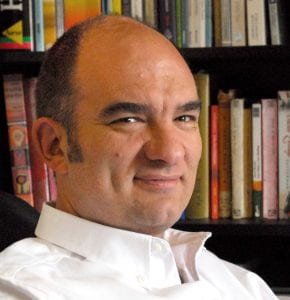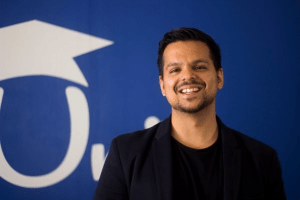APT2021 Schedule for the day
All abstracts (downloadable PDF)
- Parallel Sessions 1 1030 to 1130 Abstracts and session descriptions Amended (Downloadable PDF)
- Parallel Sessions 2 1310 to 1410 Abstracts and session descriptions
- Parallel Sessions 3 14:20 to 15:50 Abstracts and session descriptions
- Workshops 11:40 to 12:40 Abstracts and Session Descriptions
Keynote Speakers
Alejandro (Ale) Armellini
Alejandro (Ale) Armellini is Professor and Dean of Digital and Distributed Learning at the University of Portsmouth in the United Kingdom. His key role is to provide leadership in digital learning and learning innovation, including on-campus and distance provision, across all Faculties. Before joining Portsmouth, Ale was Dean of Learning and Teaching at the University of Northampton, where he was the strategic lead for the redesign of all programmes for active blended learning. Ale is a Principal Fellow of the Higher Education Academy and Fellow of the Royal Society for the Encouragement of Arts, Manufactures and Commerce. Ale’s research and doctoral supervision focus on learning innovation, blended and online pedagogy, institutional capacity building and open practices. He holds visiting professorships at several UK and overseas universities. More information on Ale’s profile page.
Download abstract Planning for active, blended and connected learning in a post-pandemic world
Anish Bagga
When Anish was a student, he observed and experienced an apparent disconnect in how staff and students raised and addressed key concerns in their department. This communication gap led to significant frustration amongst students.
As a sociology student, he decided to do his final year dissertation on the disconnect between students and HE staff. He discovered institutions struggled in many ways to close the feedback loop.
The need to close the loop was there, but the how-to wasn’t. That’s when Anish decided to create a solution to this problem.
He co-founded Unitu, a digital student voice platform that helps universities engage with student voice in real-time and close the feedback loop.
In its 5th year, Unitu works with 15 institutions across the UK and has over 100K students using the platform. Many institutions have experienced an 11-14 point increase in their NSS student voice scores.
Unitu has also helped Swansea University win the Tech Innovation of the Year from the Times Higher Education Awards. They described Unitu as transformative and instrumental in providing a voice for students who are often hard to reach and being an ally in driving positive changes.
Download abstract: Using technology to effectively close the feedback loop
10:30 - 11:30 PARALLEL SESSIONS - Session 1
Breakout Room 1:
Using Mixed Reality for Remote Medical Education, Thomas Hurkxkens & Dr Argita Zalli, Imperial College. – PRESENTATION WITHDRAWN
The UCL Introductory Programme – joining a community of disruptive thinking, Steve Rowett & Viki Burnage, UCL.
Engaging work-based business learners in online spaces through the development of digital residency
Michelle Barr & Dr Lucy Hatt, Newcastle University
Breakout Room 2:
Student engagement with online learning in a Psychology undergraduate programme: Reflections and next steps, Dr Pauldy Otermans & Dr Sofia Barbosa Boucas, Brunel University London
Reflections on a successful ‘online pivot’: learning for the future. Doug Specht, Peter Hartley; Peter Chatterton; Gunter Saunders, Westminster University
The Use of Blogs in Developing L2 Writing Skills, Maria Sibiryakova & Leo Havermann, UCL
Breakout Room 3:
ABC Learning Design and the challenges of online. Clive Young & Nataša Perović, UCL
Using the disruption of the pandemic to enhance online assessment design. Gwyneth Hughes, UCL, Linda Amrane-Cooper, UoL & Alan Tait, OU.
Relational Pedagogy in virtual learning environments: A study of online approaches to the development of Communities of enquiry Higher Education. Stephen Powell & Orlagh McCabe, Manchester Metropolitan University
Breakout Room 4:
Covid-19 Medical Education: Team-Based E-learning, Will Austin, Dr Hatim Abdulhussein, Brunel University/ Hull York Medical School
Innovations in teaching: responding to COVID-19 and developing a sustainable online, collaborative, cross-institutional approach to deliver Team-Based Learning using appropriate digital tools and platforms. Ms Shafeena Anas, Dr Adam Cocks, Dr Pascale Kippelen, Ms Anastasia Christoforou, Dr Markus Laine, Dr Salla Jokela and Dr Jonathon Taylor & Professor Louise Mansfield, Brunel University London & Tampere University
The use of chatbot technology for improving connectedness and learning support among international students during the COVID-19 Pandemic, Dr. Sylvie Studente, Dr. Stephen Ellis & Dr. Filia Garivaldis, Regent’s University London
Breakout Room 5:
Digital assessment – an Alexander Pope or Star Trek moment? Simon Walker, Grayson Jones, Joanne Moles, Steve Rowett, UCL
The Dream Team: Designing fairer group assessments, Dr Jim Turner, Jack Ennis, & Will Moindrot, Dr Tünde Varga-Atkins, Liverpool John Moores University, Newcastle University and University of Liverpool
Tutors’ and students’ approach to a pedagogic shift to Active Blended Learning (ABL). Virginia Teixeira Antunes & Rob Howe, University of Northampton
11:40 - 12:40 WORKSHOPS
Workshop 1: Learning from Each Other in Disruptive Times through Design Thinking. Bo Kelestyn, Rebecca Freeman, Johannes Pittgens & Luke Netherclift, University of Warwick click here for workshop description
Workshop 2: Finding your tribe – how cross-institutional collaboration fosters creative connections to boost learning and teaching in a pandemic. Anna Hunter, Chrissi Nerantzi, Neil Withnell, Emma Gillaspy, Alex Spiers , Rachelle O’Brien, Nathalie Tasler, University of Central Lancashire click here for workshop description
Workshop 3: Putting Inclusivity at the heart of learning design. Darren Gash, University of the Arts London workshop withdrawn but author has provided a self-paced activity click here to download
Workshop 4: IDEAS (Inspiration for Digital Engagement Activities). Silvia Colaiacomo, Leo Havemann, Abbi Shaw, Sam Ahern, Simon Walker, Clive Young, Tim Neumann – click here for workshop description
13:10 - 14:10 PARALLEL SESSIONS - Session 2
Change for good: Taking rapidly evolved education technology advice forward. Tim Neumann, UCL Knowledge Lab
Should we see students’ cameras when we teach online. Cat Bazela, Pete Mella & Rob Spark, University of Sheffield
The Use of WhatsApp® in Medical Education: Building a new community during a pandemic. Dr Charlotte Patterson, Dr Victoria Shivji; Indran Balakrishnan, Professor Alison Rodger, Dr Indran Balakrishnan Alison Rodger, Royal Free London NHS Foundation Trust; University College London
Breakout Room 2:
An Inclusive Approach to Exams as a Response to the Pandemic. Dr Jennifer George, Goldsmiths, University of London
Evening Report: Student-Faculty Shared Learning for Clinical Reasoning, Dr Adam Boggon, Matthew McCann, Royal Free Hospital & University College London
Finding common ground in a degree apprenticeship: the challenges of work-integrated learning for Gen Y and Gen Z. Dr Paula Nottingham, Middlesex University
Break Out Room 3:
Hybrid Teaching: Fight or Flight? James Rutherford, Dominic Pates & Ivan Sikora, City, University of London
Care, community and curriculum: a case study of an academic professional development programme. Dr Muireann O’Keeffe, Dr Roisin Donnelly, Dr Claire McAvinia, Seamus Harrington, Marese Kelly, Technological University Dublin
Breakout Room 4
All the world’s a stage” – the Open Broadcaster Software (OBS) as enabling technology to overcome restrictions in online teaching. Gerhard Kristandl, University of Greenwich
Engineering Minecraft: hands-on & collaborative leaning in a virtual lab. Dr Rebecca Yerworth, UCL
Digital Transformation- a rapid approach to transforming curriculum delivery. Adele Cushing & Zad Santospirito, Birkbeck, University of London
Breakout Room 5:
Breaking the Silence in Online Spaces: How Socialization Strategies Using Digital Technology Inspired a Community Outreach Project on Anti-Racism, Simone Adams, Barbora Orlicka & Antonia Pohlmann, University of Graz, Austria
How UCL Economics Walk went virtual, Ramin Nassehi, UCL
Mobius – an innovative online maths resource for widening participation through individualised learning pathways. Shaheen Charlwood & Judith Brown, University of Warwick
14:20 – 15:00 PARALLEL SESSION 3
Breakout Room 1:
Supporting student progress and self regulation using personalised analytics. Andy Smidt & Danny Liu, The University of Sydney
Learning to Walk Again: An Educator’s Journey Teaching in Virtual Reality. Melanie Garson, UCL
Breakout Room 2:
Evolving Perceptions of Content Capture. Shaun Searle, Dr Stephen Webb & Dr Harriet Dunbar-Morris, University of Portsmouth
Teaching the teachers to teach online: The experiences of clinical educators delivering a ‘Micro-teach’ via Zoom. Dr Lucy Spowart, Dr Tristan Price & Mohammed Ibrar Perwaiz, The University of Plymouth
Break Out Room 3:
Conclusions from the HWOnline-PGTOnline project: When good practices in online education prepare you for “emergency learning”. Mari-Cruz Garcia Vallejo, Heriot-Watt University
Reflecting on a student’s view of interactions and communications before, during and after lockdown. Eileen Bracken, University of Limerick
Breakout Room 4
Therapists on Twitter: A case study of facilitating #TraineeTalk, an innovative international social media learning community for student counsellors and psychotherapists. Dr Peter Blundell & Caz Binstead, Liverpool John Moores University & #TherapistsConnect
Developing an online community for a distance learning course in law. Sara Thornes & Rebecca Oglethorpe, Leeds Beckett University

